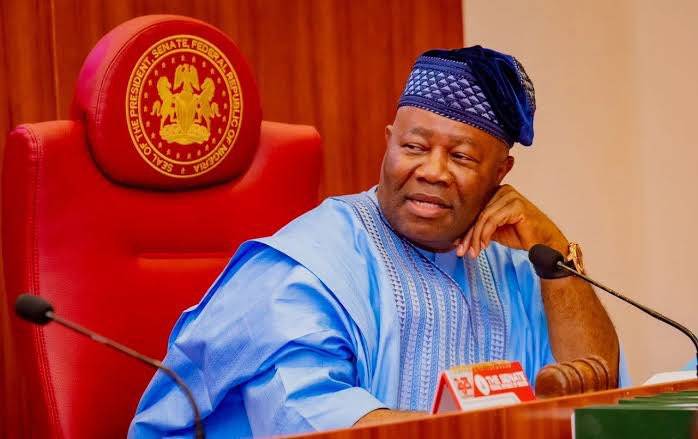The Nigeria Senate has taken significant legislative steps towards reverting to Nigeria’s former national anthem. In a move that highlights the red chamber’s adaptability, the Nigeria Senate adjusted its rules to facilitate both the first and second readings of the bill on the same day. This expedited process underscores the urgency and importance that lawmakers attach to the proposed change.
Presiding over the plenary session, Nigeria Senate President Godswill Akpabio directed the Committee on Judiciary, Human Rights and Legal Matters to conduct further legislative scrutiny on the bill. Akpabio emphasized the need for a swift report from the committee, reflecting the broad support among Nigeria Senate members for this initiative. The legislative body’s proactive stance signifies a concerted effort to enhance national unity and patriotism through the symbolic power of the national anthem.
Nigeria Senate Champion Patriotism Through Old Anthem
Several senators have articulated strong support for reverting to the previous national anthem, citing its potential to foster greater national pride and unity. Senator Victor Umeh of Anambra Central criticized the current anthem for its perceived lack of clarity and evocative power. He argued that the old anthem, with its richer content, would better inspire patriotic sentiments among Nigerians.
Senators Jimoh Ibrahim and Diket Plang echoed Umeh’s sentiments, stressing the anthem’s role in promoting a sense of brotherhood and reducing tribalism. Ibrahim, in his lead debate, reminisced about the profound impact the old anthem had on Nigerians in the 1960s and 70s. He noted that the anthem was instrumental in shaping national identity, unity, and a sense of personal belonging, encapsulating Nigeria’s cultural heritage and national aspirations.
Historical Significance and National Identity
The Nigeria Senate’s debate on the national anthem brought to the fore the historical significance and enduring impact of the old anthem on Nigeria’s collective consciousness. Senator Jimoh Ibrahim highlighted the anthem’s role in invoking nostalgia and patriotic reflections, reminding Nigerians of the country’s early years and its journey towards nationhood. He described the anthem as a powerful symbol of national pride that encapsulated Nigeria’s values and hopes for a united and prosperous future.
Ibrahim further argued that the musical and lyrical quality of the old anthem surpassed that of the current one, offering a more profound and accurate representation of Nigeria’s aspirations. He emphasized that at a critical juncture in Nigeria’s history, it was imperative to leverage every opportunity to unify the nation and foster a deep sense of patriotism among its citizens. The old anthem, he contended, provided a perfect platform for such patriotic reflections and national unity.
The Nigeria Senate’s initiative to revert to the former national anthem is a testament to the lawmakers’ commitment to reinforcing national identity and unity through cultural symbols. As the Committee on Judiciary, Human Rights and Legal Matters proceeds with its legislative review, the nation awaits the potential restoration of a cherished emblem of Nigeria’s past and a beacon for its future.
Nigerians Reactions To Senate Propose Change to National Anthem: Public Reaction is Mixed
The Nigerian lawmakers have recently proposed a bill to revert the national anthem, claiming that the current anthem is unrealistic. This move has sparked a significant debate among citizens, who have voiced their opinions on social media platforms like X (formerly known as Twitter). The lawmakers believe that the anthem should better reflect the nation’s present realities, but many Nigerians see the proposal as misplaced and unnecessary.
One Twitter user, @citizensolu, expressed strong disappointment, stating, “Nigeria Senators woke up and decided the ‘national anthem’ is our major problem? Very disappointed!” This sentiment resonates with many who believe that there are more pressing issues at hand. Another user, @HenryMD, emphasized that the primary responsibility of representatives should be to address the immediate needs of their communities, especially given the current economic challenges. “I don’t think this is necessary at the moment! As a representative, your primary assignment is to bring dividends of democracy to your communities and constituency, especially at this time Nigerians are feeling the temporary economic effects of good policy decisions by Pres Tinubu,” he tweeted.
Citizens Demand Focus on More Pressing Issues for Nigeria Senate
Many Nigerians have taken to social media to voice their frustrations, arguing that the lawmakers should prioritize more urgent matters. @Abdullahiumar questioned the rationale behind the proposed change, asking, “They want us to start learning the new national anthem for what? Is that going to bring Nigeria back to where it was in the past?” This highlights a common concern that changing the anthem does not address the country’s fundamental problems.
Further echoing this sentiment, @otunba007 pointed out the pressing issue of food security in Nigeria. “Can we tell the Senate members the current price of tomatoes in the market and the high cost of food? Man that has no food to eat will sing national anthem? Pls focus first on food! Food! Food! Then the people can listen,” he urged. This reflects a broader frustration among the populace who feel that their daily struggles with high living costs and economic hardship are being ignored by those in power.
The proposed change to the national anthem has not been well received by many Nigerians, who see it as a distraction from the more critical issues facing the nation. The Nigeria Senate attempt to revert the anthem has sparked a debate on the priorities of the government and the real needs of the people.
Table of Contents
Discover more from OGM News NG
Subscribe to get the latest posts sent to your email.














